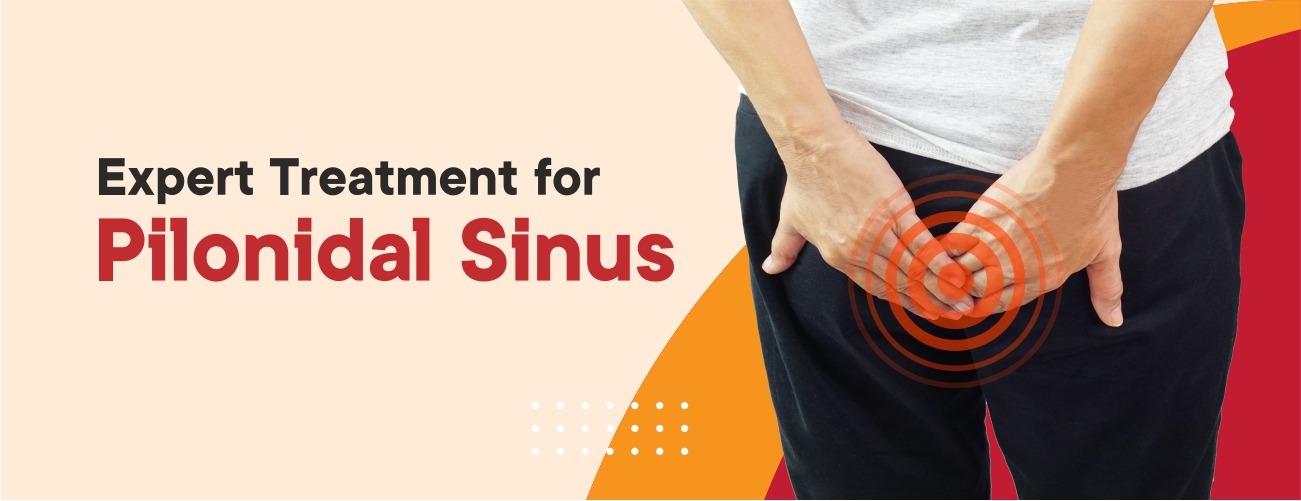Pilonidal Sinus Surgery in Gurgaon

Are you looking for the newest and most effective way to treat your Pilonidal Sinus? Then you don’t need to go anywhere other than SCI hospital, the best pilonidal sinus hospital in Gurgaon. To assure your quick recovery and long-lasting relief, our specialized Pilonidal Sinus Surgery service is built to offer you complete care while applying cutting-edge treatments, such as Laser treatment.
What Is Pilonidal Sinus?
Pilonidal Sinus is a common condition characterized by the development of a small tunnel or cyst in the skin near the tailbone. It can spread faster, hurt people, and make them feel bad, If you don't treat this disease at the right time. It often starts as a small pit or depression and may become more pronounced over time. This disease occurs with various factors like growth of hairs and local trauma. which can cause hair and other things to build up in the pit, This may result in inflammation, infection, and the formation of a cyst or abscess, which can cause pain, swelling, tenderness, and the release of pus or fluid. Antibiotics can be used to treat infections, abscesses can be cut open and drained, or the sinus can be removed surgically. To stop a return, you must take care of your wounds and keep yourself clean.

Causes of Pilonidal Sinus
There are a few things that cause pilonidal sinus:
- Skin rubbing from tight clothes
- An inactive lifestyle involving prolonged sitting
- Minor trauma or injury to the buttock area
- Humidity and sweat in the buttock area
Symptoms of Pilonidal Sinus
Common symptoms of Pilonidal Sinus may include:
- Pain and tenderness in the affected area
- Swelling and redness
- Drainage of pus or blood
- Itching and discomfort while sitting or standing
Risk Factors For Pilonidal Sinus
Several factors may increase the risk of developing Pilonidal Sinus, including:
- Excess hair growth
- Being overweight or obese
- Prolonged sitting or driving
- Bad cleanliness
- Family history of the condition
How are Pilonidal Sinuses Treated?
Laser ablation: SCI Hospital performs modern laser pilonidal sinus surgery in gurgaon. The top pilonidal sinus doctors diagnose and cure. Laser sinus therapy reduces pain, healing, and recurrence.
Surgical excision: This is typical treatment for pilonidal sinus. The surgeon will cut the skin to remove the infected region. Staple or suture the wound.
Cryotherapy: Cryotherapy uses subzero temperatures for treatment. It reduces pain and inflammation, aiding healing. This new strategy boosts health and the body's natural healing.
Electrocautery: Electrocautery slices or breaks down tissue with high-frequency currents. Surgeries use these equipment to halt bleeding, remove tumors, and sculpt tissues.
Our Services
Contact Info
- M 4, Near M Block Market, Greater Kailash-1, New Delhi, 110048
Contact Info
- Plot No. 7, Golf Course Rd, Sector 43, Gurugram, Haryana 122002
Why Choose SCI Hospital for Pilonidal Sinus Surgery in Gurgaon
When you opt for pilonidal sinus surgery at SCI Hospital in Gurgaon, you can expect a range of exceptional benefits. Our distinguished team of pilonidal sinus specialists and medical experts has a lot of experience treating this condition successfully. This means that you will get the best care possible. We use the most advanced, cutting-edge tools to give you the best medical care. Our state-of-the-art facilities and comfortable atmosphere make your treatment even better. We look at your health as a whole, from the first diagnosis to the care you get after surgery. Notably, SCI Hospital is known for its skill in laser treatment for Pilonidal Sinus, which helps patients heal faster and has better results. Upholding a patient-centric philosophy, your comfort and satisfaction are our utmost priorities, ensuring a worry-free journey. Embark on the path towards a pain-free life by selecting SCI Hospital's Pilonidal Sinus Surgery in Gurgaon as your first step.
Best Doctors for Pilonidal Sinus in Gurgaon
Image Gallery
Frequently Asked Questions Pilonisal Sinus Surgery






















